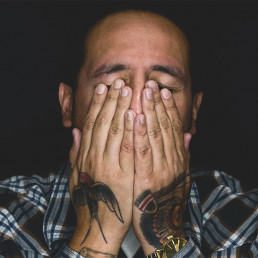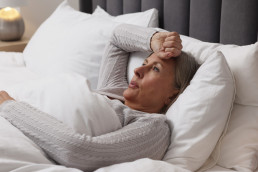Anxiety & Stress
All of us will experience stress and anxiety to some degree throughout our lives.
It’s a normal human emotion that we feel when faced with a challenge, a threat, or uncertainty. Anxiety plays an important role to help us prepare for difficult or dangerous situations. For example, when we feel anxious our heart rate and breathing rate will speed up, increasing blood flow and oxygen to the brain and body, helping us to think and act quickly if we need to. Normal amounts of anxiety are useful, and at times essential, however if the anxiety remains high when we no longer need it, the feelings can become distressing and exhausting.
Anxiety disorders and chronic stress
When anxiety is triggered too quickly and easily, or is prolonged in situations that don’t require it, you may begin to feel out of control, or start to worry about the anxiety itself. Feeling “anxious about anxiety” is a part of a negative spiral that can be difficult to break, and it may start to interfere in with your work, in social situations, and other parts of your daily life.
Chronic stress can occur after a prolonged exposure to demands and stressors, without adequate time to rest and recuperate. Many of the signs and symptoms overlap with anxiety, and the treatment approaches for anxiety can also reduce chronic stress.


Common signs and symptoms of anxiety & stress
While people can experience anxiety in different ways, these are some of the common signs and symptoms.
Physical
- panic attacks
- racing heart
- rapid breathing
- hot and cold flushes
- tightening or pain in the chest
- restlessness
- nausea
- dizziness
- feeling tense, wound up and edgy
- insomnia
- fatigue and exhaustion
- Physical health issues such as IBS, stomach issues and rashes
- Headaches and muscle tension
- Jaw pain, grinding teeth
Psychological
- excessive worry and fear
- imagining the worst (catastrophizing)
- ruminating or obsessive thinking
- self-critical thinking “I can’t do this” “I’m failing”
- difficulty in thinking, organising and problem solving
Behavioural
- trying to avoid situations that make you feel anxious
- withdrawing and cancelling social commitments
- procrastinating and not getting tasks done
- over-eating, using alcohol or other drugs to cope with anxiety
- people pleasing and avoiding conflict
- not progressing with life goals
How common is anxiety?
Anxiety is the most common mental health condition in Australia, affecting one in three women and one in five men at some point in their lives.


What are different types of anxiety?
There are many different types of anxiety, and it is not uncommon to experience a few of these types together. These include:
- Generalised anxiety
- Social anxiety and social phobia
- Panic attacks
- Agoraphobia
- Health anxiety
- Perinatal anxiety
- Post-Traumatic Stress Disorder (PTSD)
- Phobias and Fears
- Obsessive Compulsive Disorder (OCD)
- Perfectionism
- Chronic stress and burn out
Treatment for anxiety & stress
Anxiety is highly treatable, with good success rates for psychological therapy that draw on treatment approaches such as Cognitive Behavioural Therapy (CBT), Mindfulness-based interventions (MBIs), Eye Movement and Desensitization Reprocessing (EMDR), and Acceptance and Commitment Therapy (ACT).
Treatment for anxiety & stress on the Gold Coast
Dr Giselle Withers is an experienced Clinical Psychologist at Avoka Health on the Gold Coast, who can help you overcome anxiety. Giselle has advanced training at a doctoral level in mental health assessment and psychological therapy, and has over 20 years of experience treating anxiety and a range of other mental health problems. Giselle has a compassionate and non-judgemental counselling style, and will work with you to understand the causes of your anxiety, and help you develop skills and strategies to feel happier, healthier, and more at ease with yourself and others. Learn more about Giselle’s approach here.
Your first step
If you have been feeling anxious or stressed for a while, an important first step is to talk to your general practitioner (GP). Your GP can provide an initial assessment to look at your overall health and symptoms, and discuss treatment options with you. If appropriate, your GP can prepare a Mental Health Treatment Plan which will allow you to access a Medicare rebate for your psychology sessions. Getting the right support early can help prevent feelings of anxiety deteriorating further, and can help you start feeling more relaxed and confident in your life.
Making a booking with Dr Giselle Withers
To make an appointment with Dr Giselle please contact Avoka Health using the links below.
If you have a GP referral, you can ask your GP to send this directly to Giselle or you can email a copy to Giselle yourself before your first appointment.





